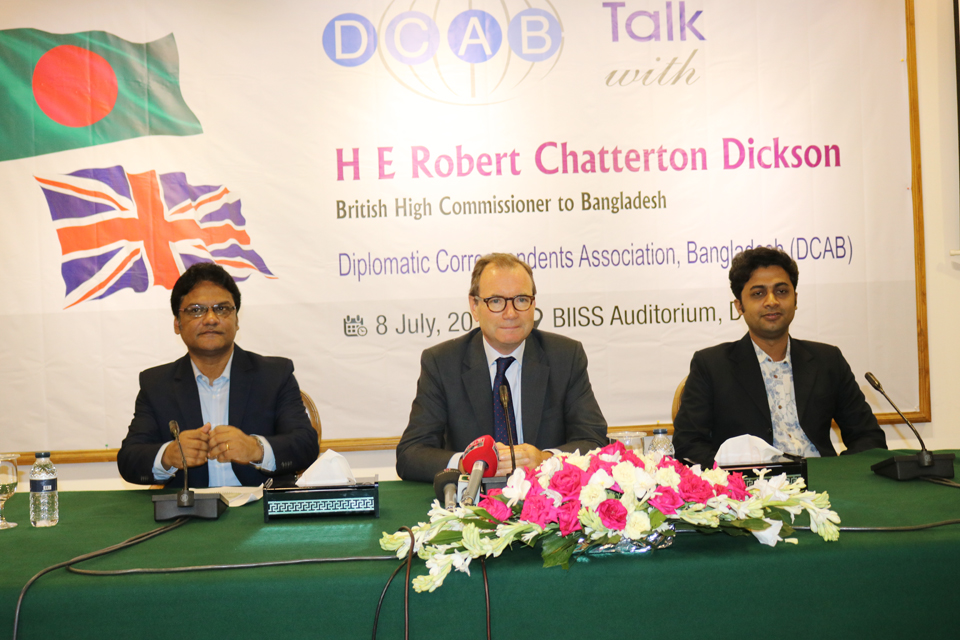Diplomatic Correspondent Association of Bangladesh (DCAB) Talk 2019: speech by Robert Chatterton Dickson
British High Commissioner to Bangladesh Robert Chatterton Dickson delivered a speech at the DCAB Talk in Dhaka on 8 July 2019, highlighting the deep UK-Bangladesh relationship.

As a long standing friend of Bangladesh and its people, we deeply value the UK’s relationship with Bangladesh.
I know you are looking forward to your 50th anniversary in two years’ time, and to celebrating your many achievements, from bringing over 50 million people out of extreme poverty since 1990, to increasing life expectancy and reducing infant mortality, to boosting your economy to one of the fastest growing in the world.
We will be celebrating with you, remembering the part our country played in your liberation struggle.
There are around 600,000 people of Bangladeshi origin in the UK. People of Bangladeshi origin play a huge role in the UK including in business, civil society and across the full spectrum of local and central government. There are three British MPs of Bangladeshi origin, one member of the House of Lords and over 100 councillors with Bangladeshi heritage across the UK.
The UK is the third largest export market for Bangladesh. UK-Bangladesh bilateral trade in 2018 was £3.6 billion, with Bangladesh exporting £3 billion of goods and services to the UK and the UK exporting £627 million of goods and services to Bangladesh.
The UK is Bangladesh’s second largest source of Foreign Direct Investment (FDI). In 2018, the UK’s net FDI into Bangladesh was US$ 373 million.
The UK is committed to maintaining Bangladesh’s duty-free and quota-free market access once the UK leaves the EU. Furthermore, UK Export Finance current credit limit of £750 million for Bangladesh market shows the UK’s commitment to support potential business opportunities in Bangladesh.
The UK is the 6th largest source of remittance for Bangladesh, with a value of US$ 1.1 billion.
Our aid agency DFID continues to work tirelessly to help the less fortunate, and of this I am extremely proud.
DFID’s programme in Bangladesh for 2019/20 totals £192m. Our support is improving the quality of basic services and good governance, supporting the private sector, and reducing natural disasters and climate change risks to development.
Since 2015/2016 we have helped 1.5m children gain a decent education; provided 0.9m people with access to clean water/sanitation; supported 360,000 small business with access to finance and reached 5.6m children, women and adolescent girls through nutrition-related interventions.
By 2021 DFID will support 590,000 more children to gain a quality education; provide improved nutrition for an additional 3.7m women and children and support an additional 230,000 people gain access to improved water & sanitation.
The UK is one of the largest donors in Bangladesh, committing £129 million in humanitarian assistance since August 2017. UK aid is making a big difference on the ground, including providing food and nutrition, shelter, health, protection, and water & sanitation, and targeted support for women and girls.
As Bangladesh continues its journey of reaching Middle Income Status it is so vital to allow space for a vibrant civil society, through which the people – and especially young people – can channel their energies, and indeed their frustrations, within the law.
Freedom of expression and the media are essential qualities of any functioning democracy; people must be allowed to discuss and debate issues freely, to challenge their governments, and to make informed decisions.
A free media is vital to creating an active, informed, creative and engaged population. It is an enabling factor for a range of objectives, including good governance, democracy, gender and other equalities, and poverty reduction.
That is why the UK is committed to media freedom and the protection of journalists across the world and will be co-hosting a global Media Freedom Conference.
The conference will look at four areas:
- national frameworks and legislation
- protection and prosecution including impunity
- building trust in the media/countering disinformation
- media sustainability
6 journalists and media activists from Bangladesh are attending this conference. The Bangladesh High Commissioner in London will also be attending.
The conference will shine a spotlight on media repression, and build a coalition of governments committed to a stronger diplomatic response when media freedom is curtailed.
Our co-host Canada is developing a pledge, which we hope participants will sign up to so that they can protect journalists and defend media freedom in their countries.